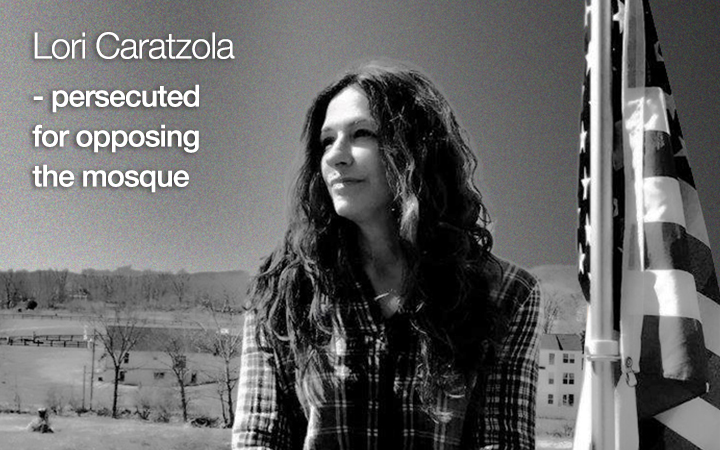Tuesday, March 28, 2017
Outrageous Unconstitutional Intimidation of Private Citizens Who Opposed Mosque Project; Thomas More Law Center Steps In
ANN
ARBOR, MI – If you speak out against building a mosque in your
community, you may be slapped with a subpoena demanding all your
personal documents, including emails, voicemails, text messages, and
social media posts concerning Muslims, Islam, mosques, the Quran, Muslim
worship or prayer services, wudu, imams, burkas, hijabs, Sharia, jihad,
or anything else associated with or related to Muslims or Islam.
This
was part of the harassment and intimidation experienced by scores of
private citizens of the small New Jersey town, Bernards Township (also
known as Basking Ridge), who spoke out at public hearings
against a plan to build a disproportionately-sized mosque on a small
piece of residential property. The mosque project, sponsored by the
Islamic Society of Basking Ridge (“ISBR”) and its president, Mohammad
Ali Chaudry, was denied by Township officials for not complying with
local building ordinances.
On
March 10, 2016, ISBR and Mohammad Ali Chaudry sued Bernards Township in
federal court, claiming various violations of the Religious Land Use
and Institutionalized Persons Act. Shortly after, ISBR had coercive
subpoenas served on private citizens whose only involvement was voicing
concerns at public planning board meetings about whether the proposed mosque complied with local building ordinances.
The
United States District Court for the District of New Jersey recently
granted the Thomas More Law Center, a national public interest law firm
based in Ann Arbor, Michigan, permission to represent, without charge,
several of these citizens who desired to quash the coercive and abusive
subpoenas. Westfield, New Jersey attorney Michael P. Hrycak is
assisting the Law Center.
Richard
Thompson, President and Chief Counsel of the Thomas More Law Center,
commented: “ISBR is setting a dangerous unconstitutional precedent by
abusing a court process to chill and trample on the First Amendment
Rights of private citizens whose only involvement was to speak out
against the mosque at public hearings. Because the U.S. Supreme Court
has held that speech at a public place on a matter of public concern is
entitled to special protection, we will ask the Federal
District Court to quash the subpoenas served on our clients as a misuse
and abuse of the Court’s process.”
Lori
Caratzola, described in the ISBR Complaint as a fervent and frequent
objector to the mosque, was a prime target for ISBR’s personal attacks.
She was personally mentioned over a dozen times in their Complaint.
Yet she has remained steadfast in her opposition. Ms. Caratzola
commented:
“Being
served with a Federal Court Subpoena to turn over all my personal
communications including voicemails, social media, emails, notes wherein
I make any mention of anything having to do with Islam is an absolute
violation of my First Amendment rights. I was a citizen exercising my
right to attend public planning board meetings about a land use
application that affected my community.”
She continued:
“Dr.
Chaudry’s clear intent was to embarrass, strike fear, silence and cause
financial harm to any citizen who dared oppose his nonconforming
project. And if these subpoenas are allowed to stand, it will set a
chilling precedent for all citizens who wish to exercise their
Constitutionally protected right to free speech and to petition their
government.
“I
was named numerous times in the Complaint, yet as a non-party, I had no
standing to challenge the lies and half-truths told about me. After
the Complaint was filed, mainstream media picked up and repeated these
lies and half-truths.”
Caratzola concluded:
“I
have lost days, probably weeks, devoting time to trying to find counsel
– only to find most attorneys are afraid of challenging an Islamic
group in today’s political climate.”
Attorney Karen Lugo, a specialist on constitutional law and zoning issues, echoed Lori Caratzola’s concerns:
“ISBR’s
subpoena of private citizens’ communications with local government, as
well as all personal email and social media statements related to
‘anything associated with or related to Muslims or Islam’ is in direct
violation of speech protections enshrined in the Constitution and in
Supreme Court rulings. ISBR’s blatant efforts to chill the free exercise
of speech while intimidating local citizens with these subpoenas must
not only be denied, but must be rebuked, by the courts.”
Cody Smith, another subpoenaed resident who opposed the Mosque, stated:
“The
planning board did exactly what it should have done—set emotions aside
and judge ISBR’s application solely on its merits and whether it
complied with our local regulations. It’s unfortunate that Dr. Chaudry,
the Township’s former mayor, has resorted to an all-out smear campaign
and retaliation against residents who exercised their fundamental
Constitutional rights of Free Speech in a public forum.”
Soon
after ISBR’s lawsuit, DOJ investigators opened another coercive front
by attempting to interview the private citizens who opposed the
mosque. Eight months later, the DOJ filed its own lawsuit against the
Township.
Astonishingly,
the DOJ was dismissive of an apparent conflict of interest between
Mohammad Ali Chaudry and the DOJ’s chief investigator, Caroline
Sadlowski, both of whom were serving together on the Center for
Religious and Cultural Conflicts board at Drew University.
Subscribe to:
Post Comments (Atom)







































No comments:
Post a Comment